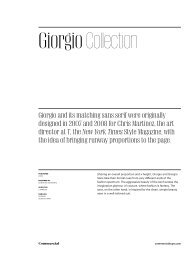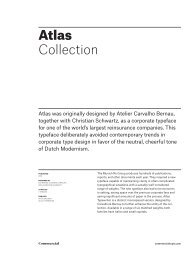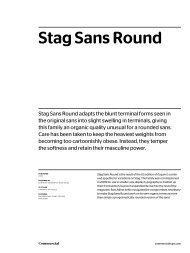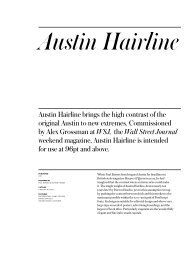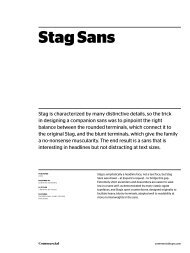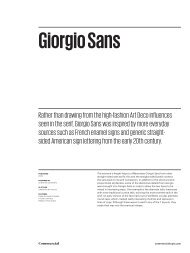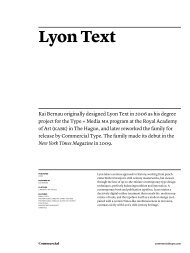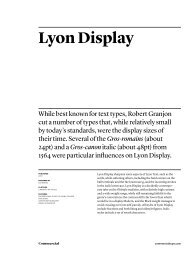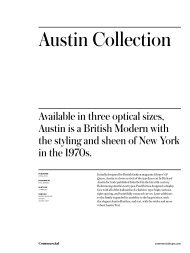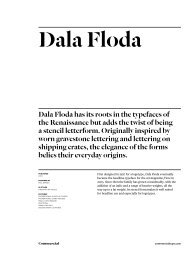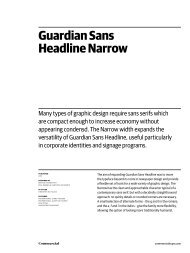Egyptian Text family - Commercial Type
Egyptian Text family - Commercial Type
Egyptian Text family - Commercial Type
- No tags were found...
Create successful ePaper yourself
Turn your PDF publications into a flip-book with our unique Google optimized e-Paper software.
Guardian<strong>Egyptian</strong> <strong>Text</strong>Guardian <strong>Egyptian</strong> <strong>Text</strong> is a capable workhorse in fourweights, tuned for optimal readability at small sizes, evenunder quite adverse printing conditions. Although it seemslike adapting Headline to <strong>Text</strong> would be a straightforwardprocess, different needs in the two sizes lead the designersto find divergent solutions, and not only in the details.PUBLISHED2009DESIGNED BYPAUL BARNES & CHRISTIAN SCHWARTZ8 STYLES4 WEIGHTS W/ ITALICSFEATURESSMALL CAPSPROPORTIONAL/TABULAR LINING FIGURESPROPORTIONAL/TABULAR OLDSTYLE FIGURESFRACTIONSSUPERSCRIPT/SUBSCRIPTORDINALSGuardian <strong>Egyptian</strong> <strong>Text</strong> has italics with less incline angle andmore open counterforms, toeing the fine line between havingenough of a textural change for emphasis without becominga distraction in a block of text. The addition of some slabs tocharacters that don’t have them in the Headline version evensout the color of text. Finally, changes in overall proportion andspacing ensure easy, comfortable reading. Guardian <strong>Egyptian</strong><strong>Text</strong> includes a comprehensive set of typographic features, suchas small caps, and supports use in a large number of languages.<strong>Commercial</strong>commercialtype.com
Guardian <strong>Egyptian</strong> <strong>Text</strong> 2 of 21Guardian <strong>Egyptian</strong> <strong>Text</strong> RegularGuardian <strong>Egyptian</strong> <strong>Text</strong> Regular ItalicGuardian <strong>Egyptian</strong> <strong>Text</strong> MediumGuardian <strong>Egyptian</strong> <strong>Text</strong> Medium ItalicGuardian <strong>Egyptian</strong> <strong>Text</strong> BoldGuardian <strong>Egyptian</strong> <strong>Text</strong> Bold ItalicGuardian <strong>Egyptian</strong> <strong>Text</strong> BlackGuardian <strong>Egyptian</strong> <strong>Text</strong> Black ItalicDuplexed text weightsDuplexed text weightsREGULAR & MEDIUM, 14 PTDuplexed text weightsDuplexed text weightsREGULAR ITALIC & MEDIUM ITALIC, 14 PTGuardian <strong>Egyptian</strong> <strong>Text</strong> Regular and Medium are duplexedon the same set of character widths, meaning that a block oftext set in one weight can be switched to the other weightwithout changing copyfit. This feature is useful for makingquick layout decisions, such as moving text into a sidebarwithout worrying about changes in length or line breaks.Duplexing is also useful for reversing a block of text out of adark background. Please note: the Regular and Medium Italicsare duplexed, but the Bold and Black are not duplexed to theRegular and Medium or one another.<strong>Commercial</strong>commercialtype.com
Guardian <strong>Egyptian</strong> <strong>Text</strong> 3 of 21New advancements in nuclear power unveiled in San FranciscoUNIVERSITY BIOLOGISTS UNCOVER NEW EVIDENCE OF THEWe don’t have many alternatives to the current NAFTA proposalEGYPTIAN TEXT REGULAR, 14 PTTest scores offer new insight into Middlebrook High School classesSEHEN WIR DAS GESAMTBILD UNSERES HEUTIGEN LEBENSNorwegian dance troupe wins first place at contemporary festivalEGYPTIAN TEXT REGULAR ITALIC, 14 PTPopular entertainment and dramas find new audience on sevenYOUNG AUTHOR’S FIRST NOVEL BREAKING SALES RECORDSThe company was consolidated in 1956 by Herman ZimmermanEGYPTIAN TEXT MEDIUM, 14 PTDada a son origine dans le dictionnaire. C’est terriblement simplePATRAS OLI KUMMANKI PÄÄ JA OIKEA KÄSI, SILLÄ UKKO JOThe University campus is an hour from downtown Boston via busEGYPTIAN TEXT MEDIUM ITALIC, 14 PTVeľmi nám treba odvážneho myslenia o všeobecných otázkachTHE PHILHARMONIC ORCHESTRA TOURS NORTH AMERICAZwecks einer näheren Erklärung habe ich mich einer einfachenEGYPTIAN TEXT BOLD, 14 PTCanalisation of the Rivers Irwell and Mersey for 56 kilometresOUT OF THE BLUE-BLACK BRUISE IN THE DISTANCE CREPTThe greater metropolitan area has over 2,547,700 inhabitantsEGYPTIAN TEXT BOLD ITALIC, 14 PTAnonymous benefactor donates £28,000 to charity fundraiserINTERNATIONAL ARCHITECTURE EXHIBIT OPENS IN KÖLNThe spectacle cannot be understood as mere visual deceptionEGYPTIAN TEXT BLACK, 14 PTDen volgenden morgen betaalde de meubelmaker zijn nachtTHE DISTRICT ATTORNEY’S OFFICE RELEASES STATEMENTIn every other art and manufacture, the effects of the theoryEGYPTIAN TEXT BLACK ITALIC, 14 PT<strong>Commercial</strong>commercialtype.com
Guardian <strong>Egyptian</strong> <strong>Text</strong> 4 of 21EGYPTIAN TEXT REGULAR, 14 PTREGULAR SMALL CAPSREGULARBOLDPROPORTIONALOLDSTYLE FIGURESREGULAR ITALICBOLDPROPORTIONALLINING FIGURESPROPORTIONALOLDSTYLE FIGURESREGULAR ITALICTHE SPANISH WAR, which began in 1739, and theFrench war which soon followed it, occasioned afurther increase of the debt, which, on the 31st ofDecember 1748, after the war had been concludedby the treaty of Aix-la-Chapelle, amounted to£78,293,313. The most profound peace, of 17 yearscontinuance, had taken no more than £8,328,354,17from it. A war, of less than nine years continuance,added £31,338,689 to it. (Refer to Postlethwaite’sHistory of the Public Revenue.) During the administrationof Mr. Pelham, the interest of the publicdebt was reduced to 3%; the sinking fund wasincreased, and some part of the public debt waspaid off. In 1755, before the breaking out of the latewar, the funded debt of Great Britain amountedto £72,289,675. On the 5th of January 1763, at theconclusion of the peace, the funded debt amounteddebt to £122,603,336. The unfunded debt has beenstated at £13,927,589. But the expense occasionedby the war did not end with the conclusion of thepeace; so that, on the 5th of January 1764, the fundeddebt was increased (partly by a new loan, andpartly by funding a part of the unfunded debt) to£129,586,789, there still remained (according to thevery well informed author of Considerations on theTrade and Finances of Great Britain) an unfundeddebt, which was brought to account in that and thefollowing year, of 975,017. In 1764, therefore, the<strong>Commercial</strong>commercialtype.com
Guardian <strong>Egyptian</strong> <strong>Text</strong> 5 of 21EGYPTIAN TEXT MEDIUM, 14 PTMEDIUM SMALL CAPSMEDIUMBLACKPROPORTIONALOLDSTYLE FIGURESMEDIUM ITALICBLACKPROPORTIONALLINING FIGURESPROPORTIONALOLDSTYLE FIGURESMEDIUM ITALICTHE SPANISH WAR, which began in 1739, and theFrench war which soon followed it, occasioned afurther increase of the debt, which, on the 31st ofDecember 1748, after the war had been concludedby the treaty of Aix-la-Chapelle, amounted to£78,293,313. The most profound peace, of 17 yearscontinuance, had taken no more than £8,328,354,17from it. A war, of less than nine years continuance,added £31,338,689 to it. (Refer to Postlethwaite’sHistory of the Public Revenue.) During the administrationof Mr. Pelham, the interest of the publicdebt was reduced to 3%; the sinking fund wasincreased, and some part of the public debt waspaid off. In 1755, before the breaking out of the latewar, the funded debt of Great Britain amountedto £72,289,675. On the 5th of January 1763, at theconclusion of the peace, the funded debt amounteddebt to £122,603,336. The unfunded debt has beenstated at £13,927,589. But the expense occasionedby the war did not end with the conclusion of thepeace; so that, on the 5th of January 1764, the fundeddebt was increased (partly by a new loan, andpartly by funding a part of the unfunded debt) to£129,586,789, there still remained (according to thevery well informed author of Considerations on theTrade and Finances of Great Britain) an unfundeddebt, which was brought to account in that and thefollowing year, of 975,017. In 1764, therefore, the<strong>Commercial</strong>commercialtype.com
Guardian <strong>Egyptian</strong> <strong>Text</strong> 6 of 21EGYPTIAN TEXT REGULAR, REGULAR ITALIC, BOLD, 11/14 PTEGYPTIAN TEXT MEDIUM, MEDIUM ITALIC, BLACK, 11/14 PTTHE OLD ENGLISH EAST INDIA COMPANYwas established in 1600, by a charterfrom Queen Elizabeth. In the first twelvevoyages which they fitted out for India,they appear to have traded as a regulatedcompany, with separate stocks,though only in the general ships of thecompany. They united into a joint stock,in 1612. Their charter was exclusive, and,though not confirmed by act of parliament,was in those days supposed toconvey a real exclusive privilege.Exclusive privilege of the royal charterFor many years, the old English EastIndia company were not much disturbedby interlopers. Their capital, whichnever exceeded £744,000, and of which£50 was a share, was not so exorbitant,nor their dealings so extensive, as toafford either a pretext for gross negligenceand profusion, or a cover to grossmalversation. Notwithstanding someextraordinary losses, occasioned partlyby the malice of the Dutch East Indiacompany, and partly by other accidents,they carried on for many years a successfultrade. But in process of time,when the principles of liberty werebetter understood, it became every daymore and more doubtful, how far a royalcharter, not confirmed by act of parliament,could convey an exclusive privilege.Upon this question, decisions ofthe courts of justice were not uniform,but varied with the authority of government,and the humours of the times.Interlopers multiplied upon them; andtowards the end of the reign of CharlesTHE OLD ENGLISH EAST INDIA COMPANYwas established in 1600, by a charterfrom Queen Elizabeth. In the first twelvevoyages which they fitted out for India,they appear to have traded as a regulatedcompany, with separate stocks,though only in the general ships of thecompany. They united into a joint stockin 1612. Their charter was exclusive, and,though not confirmed by act of parliament,was in those days supposed toconvey a real exclusive privilege.Exclusive privilege of the royal charterFor many years, the old English EastIndia company were not much disturbedby interlopers. Their capital, whichnever exceeded £744,000, and of which£50 was a share, was not so exorbitant,nor their dealings so extensive, as toafford either a pretext for gross negligenceand profusion, or a cover to grossmalversation. Notwithstanding someextraordinary losses, occasioned partlyby the malice of the Dutch East Indiacompany, and partly by other accidents,they carried on for many years a successfultrade. But in process of time,when the principles of liberty werebetter understood, it became every daymore and more doubtful, how far a royalcharter, not confirmed by act of parliament,could convey an exclusive privilege.Upon this question, decisions ofthe courts of justice were not uniform,but varied with the authority of government,and the humours of the times.Interlopers multiplied upon them; andtowards the end of the reign of Charles<strong>Commercial</strong>commercialtype.com
Guardian <strong>Egyptian</strong> <strong>Text</strong> 7 of 21EGYPTIAN TEXT REGULAR, REGULAR ITALIC, BOLD, 10/13 PTEGYPTIAN TEXT MEDIUM, MEDIUM ITALIC, BLACK, 10/13 PTTHE OLD ENGLISH EAST INDIA COMPANY wasestablished in 1600, by a charter from QueenElizabeth. In the first twelve voyages whichthey fitted out for India, they appear to havetraded as a regulated company, with separatestocks, though only in the general ships ofthe company. They united into a joint stock,in 1612. Their charter was exclusive, and,though not confirmed by act of parliament,was in those days supposed to convey a realexclusive privilege.Exclusive privilege of the royal charterFor many years, the old English East Indiacompany were not much disturbed by interlopers.Their capital, which never exceeded£744,000, and of which £50 was a share,was not so exorbitant, nor their dealings soextensive, as to afford either a pretext forgross negligence and profusion, or a cover togross malversation. Notwithstanding someextraordinary losses, occasioned partly bythe malice of the Dutch East India company,and partly by other accidents, they carriedon for many years a successful trade. But inprocess of time, when the principles of libertywere better understood, it became everyday more and more doubtful, how far a royalcharter, not confirmed by act of parliament,could convey an exclusive privilege. Uponthis question the decisions of the courts ofjustice were not uniform, but varied withthe authority of government, and the humoursof the times. Interlopers multipliedupon them; and towards the end of the reignof Charles II, through the whole of that ofJames II, and during a part of that of WilliamIII, reduced them to great distress.Ramifications of the proposal of 1968In 1698, a proposal was made to parliament,of advancing two millions to government, ateight per cent. provided the subscribers wereTHE OLD ENGLISH EAST INDIA COMPANY wasestablished in 1600, by a charter from QueenElizabeth. In the first twelve voyages whichthey fitted out for India, they appear to havetraded as a regulated company, with separatestocks, though only in the general ships ofthe company. They united into a joint stockin 1612. Their charter was exclusive, and,though not confirmed by act of parliament,was in those days supposed to convey a realexclusive privilege.Exclusive privilege of the royal charterFor many years, the old English East Indiacompany were not much disturbed by interlopers.Their capital, which never exceeded£744,000, and of which £50 was a share,was not so exorbitant, nor their dealings soextensive, as to afford either a pretext forgross negligence and profusion, or a cover togross malversation. Notwithstanding someextraordinary losses, occasioned partly bythe malice of the Dutch East India company,and partly by other accidents, they carriedon for many years a successful trade. But inprocess of time, when the principles of libertywere better understood, it became everyday more and more doubtful, how far a royalcharter, not confirmed by act of parliament,could convey an exclusive privilege. Uponthis question the decisions of the courts ofjustice were not uniform, but varied withthe authority of government, and the humoursof the times. Interlopers multipliedupon them; and towards the end of the reignof Charles II, through the whole of that ofJames II, and during a part of that of WilliamIII, reduced them to great distress.Ramifications of the proposal of 1968In 1698, a proposal was made to parliament,of advancing two millions to government, ateight per cent. provided the subscribers were<strong>Commercial</strong>commercialtype.com
Guardian <strong>Egyptian</strong> <strong>Text</strong> 8 of 21EGYPTIAN TEXT REGULAR, REGULAR ITALIC, BOLD, 9/12 PTEGYPTIAN TEXT MEDIUM, MEDIUM ITALIC, BLACK, 9/12 PTTHE OLD ENGLISH EAST INDIA COMPANY was establishedin 1600, by a charter from Queen Elizabeth.In the first twelve voyages which they fitted outfor India, they appear to have traded as a regulatedcompany, with separate stocks, though onlyin the general ships of the company. In 1612, theyunited into a joint stock. Their charter was exclusive,and, though not confirmed by act of parliament,was in those days supposed to convey areal exclusive privilege.Exclusive privilege of the royal charterFor many years, the old English East India companywere not much disturbed by interlopers. Theircapital, which never exceeded £744,000, and ofwhich £50 was a share, was not so exorbitant, northeir dealings so extensive, as to afford either apretext for gross negligence and profusion, or acover to gross malversation.Notwithstanding some extraordinary losses,occasioned partly by the malice of the Dutch EastIndia company, and partly by other accidents,they carried on for many years a successful trade.But in process of time, when the principles of libertywere better understood, it became every daymore and more doubtful, how far a royal charter,not confirmed by act of parliament, could conveyan exclusive privilege. Upon this question the decisionsof the courts of justice were not uniform,but varied with the authority of government, andthe humours of the times. Interlopers multipliedupon them; and towards the end of the reign ofCharles II, through the whole of that of James II,and during a part of that of William III, reducedthem to great distress.Ramifications of the proposal of 1968In 1698, a proposal was made to parliament, ofadvancing two millions to government, at eightper cent. provided the subscribers were erectedinto a new East India company, with exclusiveprivileges. The old East India company offeredseven hundred thousand pounds, nearly theamount of their capital, at four per cent. upon thesame conditions. But such was at that time thestate of public credit, that it was more convenientTHE OLD ENGLISH EAST INDIA COMPANY was establishedin 1600, by a charter from Queen Elizabeth.In the first twelve voyages which they fitted outfor India, they appear to have traded as a regulatedcompany, with separate stocks, though onlyin the general ships of the company. In 1612, theyunited into a joint stock. Their charter was exclusive,and, though not confirmed by act of parliament,was in those days supposed to convey areal exclusive privilege.Exclusive privilege of the royal charterFor many years, the old English East India companywere not much disturbed by interlopers. Theircapital, which never exceeded £744,000, and ofwhich £50 was a share, was not so exorbitant, northeir dealings so extensive, as to afford either apretext for gross negligence and profusion, or acover to gross malversation.Notwithstanding some extraordinary losses,occasioned partly by the malice of the Dutch EastIndia company, and partly by other accidents,they carried on for many years a successful trade.But in process of time, when the principles of libertywere better understood, it became every daymore and more doubtful, how far a royal charter,not confirmed by act of parliament, could conveyan exclusive privilege. Upon this question the decisionsof the courts of justice were not uniform,but varied with the authority of government, andthe humours of the times. Interlopers multipliedupon them; and towards the end of the reign ofCharles II, through the whole of that of James II,and during a part of that of William III, reducedthem to great distress.Ramifications of the proposal of 1968In 1698, a proposal was made to parliament, ofadvancing two millions to government, at eightper cent. provided the subscribers were erectedinto a new East India company, with exclusiveprivileges. The old East India company offeredseven hundred thousand pounds, nearly theamount of their capital, at four per cent. upon thesame conditions. But such was at that time thestate of public credit, that it was more convenient<strong>Commercial</strong>commercialtype.com
Guardian <strong>Egyptian</strong> <strong>Text</strong> 9 of 21EGYPTIAN TEXT REGULAR, REGULAR ITALIC, 8/10 PTEGYPTIAN TEXT REGULAR, REGULAR ITALIC, BOLD, 8/10 PTTHE OLD ENGLISH EAST INDIA COMPANY was establishedin 1600, by a charter from Queen Elizabeth.In the first twelve voyages which they fitted outfor India, they appear to have traded as a regulatedcompany, with separate stocks, though onlyin the general ships of the company. In 1612, theyunited into a joint stock. Their charter was exclusive,and, though not confirmed by act of parliament,was in those days supposed to convey areal exclusive privilege.For many years, the old English East Indiacompany were not much disturbed by interlopers.Their capital never exceeded £744,000, andof which £50 was a share, was not so exorbitant,nor their dealings so extensive, as to afford eithera pretext for gross negligence and profusion, or acover to gross malversation.Notwithstanding some extraordinary losses,occasioned partly by the malice of the Dutch EastIndia company, and partly by other accidents,they carried on for many years a successful trade.But in process of time, when the principles of libertywere better understood, it became every daymore and more doubtful, how far a royal charter,not confirmed by act of parliament, could conveyan exclusive privilege. Upon this question the decisionsof the courts of justice were not uniform,but varied with the authority of government, andthe humours of the times. Interlopers multipliedupon them; and towards the end of the reign ofCharles II, through the whole of that of James II,and during a part of that of William III, reducedthem to great distress.In 1698, a proposal was made to parliament,of advancing two millions, at eight per cent, togovernment. provided that the subscribers wereerected into a new East India company, with exclusiveprivileges. The old East India company offeredseven hundred thousand pounds, nearlythe amount of their capital, at four per cent. uponthe same conditions. But such was at that timethe state of public credit, that it was more convenientfor government to borrow two millions ateight per cent. than seven hundred thousandpounds at four. The proposal of the new subscriberswas accepted, and a new East India companyestablished in consequence. The old East Indiacompany, however, had a right to continue theirtrade till 1701. They had, at the same time, in thename of their treasurer, subscribed very artfullythree hundred and fifteen thousand pounds intothe stock of the new. By a negligence in the expressionof the act of parliament, which vestedthe East India trade in the subscribers to this loanTHE OLD ENGLISH EAST INDIA COMPANY was establishedin 1600, by a charter from Queen Elizabeth. In the firsttwelve voyages which they fitted out for India, theyappear to have traded as a regulated company, withseparate stocks, though only in the general ships of thecompany. In 1612, they united into a joint stock. Theircharter was exclusive, and, though not confirmed by actof parliament, was in those days supposed to convey areal exclusive privilege.Exclusive privilege of the royal charterFor many years, the old English East India companywere not much disturbed by interlopers. Their capitalnever exceeded £744,000, and of which £50 was ashare, was not so exorbitant, nor their dealings so extensive,as to afford either a pretext for gross negligenceand profusion, or a cover to gross malversation.Notwithstanding some extraordinary losses, occasionedpartly by the malice of the Dutch East India company,and partly by other accidents, they carried on formany years a successful trade. But in process of time,when the principles of liberty were better understood,it became every day more and more doubtful, how far aroyal charter, not confirmed by act of parliament, couldconvey an exclusive privilege. Upon this question thedecisions of the courts of justice were not uniform, butvaried with the authority of government, and the humoursof the times. Interlopers multiplied upon them;and towards the end of the reign of Charles II, throughthe whole of that of James II, and during a part of that ofWilliam III, reduced them to great distress.Ramifications of the proposal of 1968In 1698, a proposal was made to parliament, of advancingtwo millions, at eight per cent, to government.provided that the subscribers were erected into a newEast India company, with exclusive privileges. The oldEast India company offered seven hundred thousandpounds, nearly the amount of their capital, at four percent. upon the same conditions. But such was at thattime the state of public credit, that it was more convenientfor government to borrow two millions at eightper cent. than seven hundred thousand pounds at four.The proposal of the new subscribers was accepted, anda new East India company established in consequence.The old East India company, however, had a right tocontinue their trade till 1701. They had, at the sametime, in the name of their treasurer, subscribed veryartfully three hundred and fifteen thousand poundsinto the stock of the new. By a negligence in theexpression of the act of parliament, which vested theEast India trade in the subscribers to this loan of twomillions, it did not appear evident that they were allobliged to unite into a joint stock. A few private traders,whose subscriptions amounted only to seven thousand<strong>Commercial</strong>commercialtype.com
Guardian <strong>Egyptian</strong> <strong>Text</strong> 10 of 21EGYPTIAN TEXT MEDIUM, MEDIUM ITALIC, 8/10 PTEGYPTIAN TEXT MEDIUM, MEDIUM ITALIC, BLACK, 8/10 PTTHE OLD ENGLISH EAST INDIA COMPANY was establishedin 1600, by a charter from Queen Elizabeth.In the first twelve voyages which they fitted outfor India, they appear to have traded as a regulatedcompany, with separate stocks, though onlyin the general ships of the company. In 1612, theyunited into a joint stock. Their charter was exclusive,and, though not confirmed by act of parliament,was in those days supposed to convey areal exclusive privilege.For many years, the old English East Indiacompany were not much disturbed by interlopers.Their capital never exceeded £744,000, andof which £50 was a share, was not so exorbitant,nor their dealings so extensive, as to afford eithera pretext for gross negligence and profusion, or acover to gross malversation.Notwithstanding some extraordinary losses,occasioned partly by the malice of the Dutch EastIndia company, and partly by other accidents,they carried on for many years a successful trade.But in process of time, when the principles of libertywere better understood, it became every daymore and more doubtful, how far a royal charter,not confirmed by act of parliament, could conveyan exclusive privilege. Upon this question the decisionsof the courts of justice were not uniform,but varied with the authority of government, andthe humours of the times. Interlopers multipliedupon them; and towards the end of the reign ofCharles II, through the whole of that of James II,and during a part of that of William III, reducedthem to great distress.In 1698, a proposal was made to parliament,of advancing two millions, at eight per cent, togovernment. provided that the subscribers wereerected into a new East India company, with exclusiveprivileges. The old East India company offeredseven hundred thousand pounds, nearlythe amount of their capital, at four per cent. uponthe same conditions. But such was at that timethe state of public credit, that it was more convenientfor government to borrow two millions ateight per cent. than seven hundred thousandpounds at four. The proposal of the new subscriberswas accepted, and a new East India companyestablished in consequence. The old East Indiacompany, however, had a right to continue theirtrade till 1701. They had, at the same time, in thename of their treasurer, subscribed very artfullythree hundred and fifteen thousand pounds intothe stock of the new. By a negligence in the expressionof the act of parliament, which vestedthe East India trade in the subscribers to this loanTHE OLD ENGLISH EAST INDIA COMPANY was establishedin 1600, by a charter from Queen Elizabeth. In the firsttwelve voyages which they fitted out for India, theyappear to have traded as a regulated company, withseparate stocks, though only in the general ships of thecompany. In 1612, they united into a joint stock. Theircharter was exclusive, and, though not confirmed by actof parliament, was in those days supposed to convey areal exclusive privilege.Exclusive privilege of the royal charterFor many years, the old English East India companywere not much disturbed by interlopers. Their capitalnever exceeded £744,000, and of which £50 was ashare, was not so exorbitant, nor their dealings so extensive,as to afford either a pretext for gross negligenceand profusion, or a cover to gross malversation.Notwithstanding some extraordinary losses, occasionedpartly by the malice of the Dutch East India company,and partly by other accidents, they carried on formany years a successful trade. But in process of time,when the principles of liberty were better understood,it became every day more and more doubtful, how far aroyal charter, not confirmed by act of parliament, couldconvey an exclusive privilege. Upon this question thedecisions of the courts of justice were not uniform, butvaried with the authority of government, and the humoursof the times. Interlopers multiplied upon them;and towards the end of the reign of Charles II, throughthe whole of that of James II, and during a part of that ofWilliam III, reduced them to great distress.Ramifications of the proposal of 1968In 1698, a proposal was made to parliament, of advancingtwo millions, at eight per cent, to government.provided that the subscribers were erected into a newEast India company, with exclusive privileges. The oldEast India company offered seven hundred thousandpounds, nearly the amount of their capital, at four percent. upon the same conditions. But such was at thattime the state of public credit, that it was more convenientfor government to borrow two millions at eightper cent. than seven hundred thousand pounds at four.The proposal of the new subscribers was accepted, anda new East India company established in consequence.The old East India company, however, had a right tocontinue their trade till 1701. They had, at the sametime, in the name of their treasurer, subscribed veryartfully three hundred and fifteen thousand poundsinto the stock of the new. By a negligence in theexpression of the act of parliament, which vested theEast India trade in the subscribers to this loan of twomillions, it did not appear evident that they were allobliged to unite into a joint stock. A few private traders,whose subscriptions amounted only to seven thousand<strong>Commercial</strong>commercialtype.com
Guardian <strong>Egyptian</strong> <strong>Text</strong> 11 of 21EGYPTIAN TEXT BOLD, BOLD ITALIC, 8/10 PTEGYPTIAN TEXT BLACK, BLACK ITALIC, 8/10 PTTHE OLD ENGLISH EAST INDIA COMPANY was establishedin 1600, by a charter from Queen Elizabeth. In the firsttwelve voyages which they fitted out for India, theyappear to have traded as a regulated company, withseparate stocks, though only in the general ships of thecompany. In 1612, they united into a joint stock. Theircharter was exclusive, and, though not confirmed byact of parliament, was in those days supposed to conveya real exclusive privilege.Exclusive privilege of the royal charterFor many years, the old English East India companywere not much disturbed by interlopers. Their capitalnever exceeded £744,000, and of which £50 was ashare, was not so exorbitant, nor their dealings soextensive, as to afford either a pretext for gross negligenceand profusion, or a cover to gross malversation.Notwithstanding some extraordinary losses, occasionedby the malice of the Dutch East India company,and partly by other accidents, they carried on formany years a successful trade. But in process of time,when the principles of liberty were better understood,it became every day more and more doubtful, how fara royal charter, not confirmed by act of parliament,could convey an exclusive privilege. Upon this questionthe decisions of the courts of justice were not uniform,but varied with the authority of government, and thehumours of the times. Interlopers multiplied uponthem; and towards the end of the reign of Charles II,through the whole of that of James II, and during a partof that of William III, reduced them to great distress.Ramifications of the proposal of 1968In 1698, a proposal was made to parliament, ofadvancing two millions, at eight per cent, to government.provided that the subscribers were erected into anew East India company, with exclusive privileges. Theold East India company offered seven hundredthousand pounds, nearly the amount of their capital, atfour per cent. upon the same conditions. But such wasat that time the state of public credit, that it was moreconvenient for government to borrow two millions ateight per cent. than seven hundred thousand pounds atfour. The proposal of the new subscribers was accepted,and a new East India company established inconsequence. The old East India company, however,had a right to continue their trade till 1701. They had, atthe same time, in the name of their treasurer, subscribedvery artfully three hundred and fifteenthousand pounds into the stock of the new. By anegligence in the expression of the act of parliament,which vested the East India trade in the subscribers tothis loan of two millions, it did not appear evident thatthey were all obliged to unite into a joint stock. A fewprivate traders, whose subscriptions amounted only toTHE OLD ENGLISH EAST INDIA COMPANY was establishedin 1600, by a charter from Queen Elizabeth. In the firsttwelve voyages which they fitted out for India, theyappear to have traded as a regulated company, withseparate stocks, though only in the general ships of thecompany. In 1612, they united into a joint stock. Theircharter was exclusive, and, though not confirmed byact of parliament, was in those days supposed to conveya real exclusive privilege.Exclusive privilege of the royal charterFor many years, the old English East India companywere not much disturbed by interlopers. Their capitalnever exceeded £744,000, and of which £50 was ashare, was not so exorbitant, nor their dealings soextensive, as to afford either a pretext for gross negligenceand profusion, or a cover to gross malversation.Notwithstanding some extraordinary losses, occasionedby the malice of the Dutch East India company,and partly by other accidents, they carried on for manyyears a successful trade. But in process of time, whenthe principles of liberty were better understood, itbecame every day more and more doubtful, how fara royal charter, not confirmed by act of parliament,could convey an exclusive privilege. Upon this questionthe decisions of the courts of justice were not uniform,but varied with the authority of government, andthe humours of the times. Interlopers multiplied uponthem; and towards the end of the reign of Charles II,through the whole of that of James II, and during a partof that of William III, reduced them to great distress.Ramifications of the proposal of 1968In 1698, a proposal was made to parliament, ofadvancing two millions, at eight per cent, to government.provided that the subscribers were erected intoa new East India company, with exclusive privileges.The old East India company offered seven hundredthousand pounds, nearly the amount of their capital,at four per cent. upon the same conditions. But suchwas at that time the state of public credit, that it wasmore convenient for government to borrow twomillions at eight per cent. than seven hundredthousand pounds at four. The proposal of the newsubscribers was accepted, and a new East Indiacompany established in consequence. The old EastIndia company, however, had a right to continue theirtrade till 1701. They had, at the same time, in the nameof their treasurer, subscribed very artfully threehundred and fifteen thousand pounds into the stock ofthe new. By a negligence in the expression of the act ofparliament, which vested the East India trade in thesubscribers to this loan of two millions, it did notappear evident that they were all obliged to unite intoa joint stock. A few private traders, whose subscrip-<strong>Commercial</strong>commercialtype.com
Guardian <strong>Egyptian</strong> <strong>Text</strong> 12 of 21EGYPTIAN TEXT REGULAR, 7/9 PTEGYPTIAN TEXT REGULAR, 7/9 PTEGYPTIAN TEXT MEDIUM, 7/9 PTTHIS DIVISION OF LABOUR, from whichmany advantages are derived, is notoriginally the effect of any wisdom,which foresees and intends that generalopulence to which it gives occasion. Itis the necessary, though very slow andgradual, consequence of a certain propensityin human nature, which has inview no such extensive utility; the propensityto truck, barter, and exchangeone thing for another.Whether this propensity be one ofthose original principles in human nature,of which no further account can begiven, or whether, as seems more probable,the necessary consequence of thefaculties of reason and speech, it belongsnot to our present subject to inquire.It is common to all men, and to befound in no other race of animals, whichseem to know neither this nor any otherspecies of contracts. Two greyhounds,in running down the same hare, havesometimes the appearance of acting insome sort of concert. Each turns her towardshis companion, or endeavours tointercept her when his companion turnsher towards himself. This, however, isThe improvements in machinery haveby no means been the inventions of thosewho had occasion to use the machines.Many improvements have been made bythe ingenuity of the makers of the machines,when to make them became thebusiness of a peculiar trade; and some bythat of those who are called philosophers,whose trade it is not to do any thing, butobserve every thing.Upon that account, are often capableof combining together the powers of themost distant and dissimilar objects in theprogress of society, philosophy becomes,like every other employment, the principalor sole trade and occupation of a particularclass of citizens.Like every other employment, too, itis subdivided into a considerable numberof different branches, each of whichaffords occupation to a peculiar tribe orclass of philosophers; and this subdivisionof employment in philosophy, aswell as in every other business, improvedexterity, and saves time. Each individualbecomes more expert in his own peculiarbranch, more work is done upon thewhole, and the quantity of science is con-The improvements in machinery haveby no means been the inventions of thosewho had occasion to use the machines.Many improvements have been made bythe ingenuity of the makers of the machines,when to make them became thebusiness of a peculiar trade; and some bythat of those who are called philosophers,whose trade it is not to do any thing, butobserve every thing.Upon that account, are often capableof combining together the powers of themost distant and dissimilar objects in theprogress of society, philosophy becomes,like every other employment, the principalor sole trade and occupation of a particularclass of citizens.Like every other employment, too, itis subdivided into a considerable numberof different branches, each of whichaffords occupation to a peculiar tribe orclass of philosophers; and this subdivisionof employment in philosophy, aswell as in every other business, improvedexterity, and saves time. Each individualbecomes more expert in his own peculiarbranch, more work is done upon thewhole, and the quantity of science is con-EGYPTIAN TEXT REGULAR, 6/8 PT [TRACKING +4] EGYPTIAN TEXT REGULAR, 6/8 PT [TRACKING +4]EGYPTIAN TEXT MEDIUM, 6/8 PT [TRACKING +4]THIS DIVISION OF LABOUR, from which manyadvantages are derived, is not originally the effectof any wisdom, which foresees and intendsthat general opulence to which it gives occasion.It is the necessary, though very slow andgradual, consequence of a certain propensity inhuman nature, which has in view no such extensiveutility; the propensity to truck, barter,and exchange one thing for another.Whether this propensity be one of thoseoriginal principles in human nature, of whichno further account can be given, or whether, asseems more probable, it be the necessary consequenceof the faculties of reason and speech,it belongs not to our present subject to inquire.It is common to all men, and to be found inno other race of animals, which seem to knowneither this nor any other species of contracts.Two greyhounds, in running down the samehare, have sometimes the appearance of actingin some sort of concert. Each turns her towardshis companion, or endeavours to intercept herwhen his companion turns her towards himself.This is not the effect of any contract, but ofthe accidental concurrence of their passions inthe same object at that particular time.Nobody ever saw a dog make a fair anddeliberate exchange of one bone for anotherwith another dog. Nobody ever saw one animal,by its gestures and natural cries signify toanother, this is mine, that yours; I am willingto give this for that. When an animal wants toThe improvements in machinery have by nomeans been the inventions of those who hadoccasion to use the machines. Many improvementshave been made by the ingenuity of themakers of the machines, when to make thembecame the business of a peculiar trade; andsome by that of those who are called philosophers,whose trade it is not to do any thing, butto observe every thing.Upon that account, are often capable of combiningtogether the powers of the most distantand dissimilar objects in the progress of society,philosophy becomes, like every other employment,the principal or sole trade and occupationof a particular class of citizens.Like every other employment, too, it is subdividedinto a considerable number of differentbranches, each of which affords occupation to apeculiar tribe or class of philosophers; and thissubdivision of employment in philosophy, aswell as in every other business, improve dexterity,and saves time.Each individual becomes more expert in hisown peculiar branch, more work is done uponthe whole, and the quantity of science is considerablyincreased by it. It is the great multiplicationof the productions of all the differentarts, in consequence of the division of labour,which occasions, in a well-governed society,that universal opulence which extends itself tothe lowest ranks of the people. Every workmanhas a great quantity of his own work to disposeThe improvements in machinery have by nomeans been the inventions of those who hadoccasion to use the machines. Many improvementshave been made by the ingenuity of themakers of the machines, when to make thembecame the business of a peculiar trade; andsome by that of those who are called philosophers,whose trade it is not to do any thing, butto observe every thing.Upon that account, are often capable of combiningtogether the powers of the most distantand dissimilar objects in the progress of society,philosophy becomes, like every other employment,the principal or sole trade and occupationof a particular class of citizens.Like every other employment, too, it is subdividedinto a considerable number of differentbranches, each of which affords occupation to apeculiar tribe or class of philosophers; and thissubdivision of employment in philosophy, aswell as in every other business, improve dexterity,and saves time.Each individual becomes more expert in hisown peculiar branch, more work is done uponthe whole, and the quantity of science is considerablyincreased by it. It is the great multiplicationof the productions of all the differentarts, in consequence of the division of labour,which occasions, in a well-governed society,that universal opulence which extends itself tothe lowest ranks of the people. Every workmanhas a great quantity of his own work to dispose<strong>Commercial</strong>commercialtype.com
Guardian <strong>Egyptian</strong> <strong>Text</strong> 13 of 21EGYPTIAN TEXT REGULAR, 9/10 PTEGYPTIAN TEXT REGULAR, 9/11 PTTHE SPANISH WAR in 1739, and the French warwhich soon followed it, created an increase ofthe debt, which, on the 31st of December 1748,after the war had been concluded by the treatyof Aix-la-Chapelle, amounted to £78,293,313. Themost profound peace, of 17 years continuance,had taken no more than £8,328,354,17 from it. Awar, of less than nine years continuance, added£31,338,689 to it. (Refer to James Postlethwaite’sThe History of the Public Revenue.) During theadministration of Mr. Pelham, the interest of thepublic debt was reduced, from 4% to 3%; thesinking fund was increased, and some part of thepublic debt was paid off. In 1755, before the breakingout of the late war, the funded debt of GreatBritain amounted to £72,289,675. On the 5th ofJanuary 1763, at the conclusion of the peace, thefunded debt amounted debt to £122,603,336. Theunfunded debt has been stated at £13,927,589.THE SPANISH WAR in 1739, and the French warwhich soon followed it, created an increase ofthe debt, which, on the 31st of December 1748,after the war had been concluded by the treatyof Aix-la-Chapelle, amounted to £78,293,313. Themost profound peace, of 17 years continuance,had taken no more than £8,328,354,17 from it. Awar, of less than nine years continuance, added£31,338,689 to it. (Refer to James Postlethwaite’sThe History of the Public Revenue.) During theadministration of Mr. Pelham, the interest of thepublic debt was reduced, from 4% to 3%; thesinking fund was increased, and some part of thepublic debt was paid off. In 1755, before the breakingout of the late war, the funded debt of GreatBritain amounted to £72,289,675. On the 5th ofJanuary 1763, at the conclusion of the peace, thefunded debt amounted debt to £122,603,336. Theunfunded debt has been stated at £13,927,589.EGYPTIAN TEXT REGULAR, 9/12 PTEGYPTIAN TEXT REGULAR, 9/13 PTTHE SPANISH WAR in 1739, and the French warwhich soon followed it, created an increase ofthe debt, which, on the 31st of December 1748,after the war had been concluded by the treatyof Aix-la-Chapelle, amounted to £78,293,313. Themost profound peace, of 17 years continuance,had taken no more than £8,328,354,17 from it. Awar, of less than nine years continuance, added£31,338,689 to it. (Refer to James Postlethwaite’sThe History of the Public Revenue.) During theadministration of Mr. Pelham, the interest of thepublic debt was reduced, from 4% to 3%; thesinking fund was increased, and some part of thepublic debt was paid off. In 1755, before the breakingout of the late war, the funded debt of GreatBritain amounted to £72,289,675. On the 5th ofJanuary 1763, at the conclusion of the peace, thefunded debt amounted debt to £122,603,336. Theunfunded debt has been stated at £13,927,589.THE SPANISH WAR in 1739, and the French warwhich soon followed it, created an increase ofthe debt, which, on the 31st of December 1748,after the war had been concluded by the treatyof Aix-la-Chapelle, amounted to £78,293,313. Themost profound peace, of 17 years continuance,had taken no more than £8,328,354,17 from it. Awar, of less than nine years continuance, added£31,338,689 to it. (Refer to James Postlethwaite’sThe History of the Public Revenue.) During theadministration of Mr. Pelham, the interest of thepublic debt was reduced, from 4% to 3%; thesinking fund was increased, and some part of thepublic debt was paid off. In 1755, before the breakingout of the late war, the funded debt of GreatBritain amounted to £72,289,675. On the 5th ofJanuary 1763, at the conclusion of the peace, thefunded debt amounted debt to £122,603,336. Theunfunded debt has been stated at £13,927,589.<strong>Commercial</strong>commercialtype.com
Guardian <strong>Egyptian</strong> <strong>Text</strong> 14 of 21ČESKÝ (CZECH)EGYPTIAN TEXT REGULAR, 9/12 PTDANSK (DANISH)EGYPTIAN TEXT REGULAR, 9/12 PTAČKOLI KLIMŠOVA nenapsala knih mnoho, přecezná ji ta naše četbychtivá mládež tuze dobře. Znáji zejména z knih: Z jara do léta, Kniha báchorek,Paleček a Malenka, Z ráje, Rodinná skřínka a j.,a pak z různých časopisů pro mládež, do nichžvelice pilně přispívá. Její práce vesměs děti našerády čítají, poněvadž skutečně vynikají vším,čeho se na dobré četbě žádá. Však Klimšova taképracuje s láskou, pracuje opravdově vážně anevydá nic na světlo, co by důkladně nepodrobilasoudu svému i soudu jiných. A to právě dodávájejím prácem té pravé ceny. Nuže seznammežse se životem této tiché a skromné pracovnice,seznammež se i s jejími pěknými spisy. Klimšovanarodila se 7. dne měsíce prosince roku 1851. vPoličce. Otec její byl dosti zámožným a váženýmměšťanem, měltě v Poličce dům a byl dlouhá létačlenem obecního zastupitelstva, ba i městskýmradním. Při domě měli Klimšovi zahrádku. Něžnámatka Bohumilčina milovala totiž velice květinya při tom lnula také velikou láskou ku zvířatům.Byla dobra, o vše, ale zvláště o děti své starostli-DER VAR en lille Havfisk af god Familie, Navnethusker jeg ikke, det maa de Lærde sige Dig. Denlille Fisk havde attenhundrede Søskende, alle ligegamle; de kjendte ikke deres Fader eller Moder,de maatte strax skjøtte sig selv og svømme om,men det var en stor Fornøielse; Vand havde denok at drikke, hele Verdenshavet, Føden tænktede ikke paa, den kom nok; hver vilde følge sinLyst, hver vilde faae sin egen Historie, ja dettænkte heller Ingen af dem paa. Solen skinnedened i Vandet, det lyste om dem, det var saa klart,det var en Verden med de forunderligste Skabninger,og nogle saa gruelig store, med voldsommeGab, de kunde sluge de attenhundrede Søskende,men det tænkte de heller ikke paa, for Ingen afdem var endnu bleven slugt. De Smaa svømmedesammen, tæt op til hverandre, som Sildene og Makrelernesvømme; men som de allerbedst svømmedei Vandet og tænkte paa Ingenting, sank,med forfærdelig Lyd, ovenfra, midt ned imellemdem, en lang, tung Ting, der slet ikke vilde holdeop; længere og længere strakte den sig, og hver afDEUTSCH (GERMAN)EGYPTIAN TEXT REGULAR, 9/12 PTESPAÑOL (SPANISH)EGYPTIAN TEXT REGULAR, 9/12 PTSEHEN WIR das Gesamtbild unseres heutigenLebens nur mit unseren Augen an, so können wirdie Folgerung ziehen, daß dieses Gebilde einenchaotischen Charakter trägt, und es kann unsnicht wundern, daß diejenigen, welche sich indiesem scheinbaren Chaos unwohl fühlen, derWelt entfliehen oder sich in geistigen Abstraktionenverlieren wollen. Doch jedenfalls muß es unsklar sein, daß diese Flucht vor der Wirklichkeitein ebenso großer Irrtum ist wie jene Anlehnungan den reinsten Materialismus. Weder die Fluchtin das Mittelalter, noch der von verschiedenenKunsthistorikern empfohlene Wiederaufbau desOlympos kann und die Lösung bringen. UnsereZeit hat eine andere Mission zu erfüllen als diedes Mittelalters und des Hellenismus. Um dieAufgabe unserer Zeit richtig zu verstehen, ist esnotwendig, daß wir nicht nur mit unseren Augen,sondern vielmehr mit unseren innerlichen Sinnesorganendie Lebensstruktur erfassen. Habenwir einmal die Synthese des Lebens aus der Tiefeunseres Wesens gewonnen und als Inhalt vonEN ESTA conferencia no pretendo, como en anteriores,definir, sino subrayar; no quiero dibujar,sino sugerir. Animar, en su exacto sentido. Herirpájaros soñolientos. Donde haya un rincón oscuro,poner un reflejo de nube alargada y regalarunos cuantos espejos de bolsillo a las señoras queasisten. He querido bajar a la ribera de los juncos.Por debajo de las tejas amarillas. A la salida de lasaldeas, donde el tigre se come a los niños. Estoyen este momento lejos del poeta que mira el reloj,lejos del poeta que lucha con la estatua, que luchacon el sueño, que lucha con la anatomía; he huidode todos mis amigos y me voy con aquel muchachoque se come la fruta verde y mira cómolas hormigas devoran al pájaro aplastado por elautomóvil. Por las calles más puras del pueblo meencontraréis; por el aire viajero y la luz tendida delas melodías que Rodrigo Caro llamó“reverendasmadres de todos los cantares”. Por todos los sitiosdonde se abre la tierna orejita rosa del niño o lablanca orejita de la niña que espera, llena de miedo,el alfiler que abra el agujero para la arracada.<strong>Commercial</strong>commercialtype.com
Guardian <strong>Egyptian</strong> <strong>Text</strong> 15 of 21FRANÇAIS (FRENCH)EGYPTIAN TEXT REGULAR, 9/12 PTDADA A son origine dans le dictionnaire. C’est terriblementsimple. En français cela signifie « chevalde bois ». En allemand « va te faire, au revoir, à laprochaine ». En roumain « oui en effet, vous avezraison, c’est ça, d’accord, vraiment, on s’en occupe», etc. C’est un mot international. Seulementun mot et ce mot comme mouvement. Très facileà comprendre. Lorsqu’on en fait une tendanceartistique, cela revient à vouloir supprimer lescomplications. Psychologie Dada. Allemagne Daday compris indigestions et crampes brouillardeuses,littérature Dada, bourgeoisie Dada et vous,très vénérés poètes, vous qui avez toujours faitde la poésie avec des mots, mais qui n’en faitesjamais du mot lui-même, vous qui tournez autourd’un simple point en poétisant. Guerre mondialeDada et pas de fin, révolution Dada et pas de commencement.Dada, amis et soi-disant poètes, trèsestimés fabricateurs et évangélistes Dada Tzara,Dada Huelsenbeck, Dada m’dada, Dada m’dada,Dada mhm, dada dera dada, Dada Hue, DadaTza. Comment obtenir la béatitude ? En disantITALIANO (ITALIAN)EGYPTIAN TEXT REGULAR, 9/12 PTDAPPRIMA, RIPETENDENDO l’errore commesso ingioventù, scrisse di animali che conosceva poco,e le sue favole risonarono di ruggiti e barriti. Poisi fece più umano, se così si può dire, scrivendodegli animali che credeva di conoscere. Cosìla mosca gli regalò una gran quantità di favoledimostrandosi un animale più utile di quanto sicreda. In una di quelle favole ammirava la velocitàdel dittero, velocità sprecata perchè non gli servivanè a raggiungere la preda nè a garantire la suaincolumità. Qui faceva la morale una testuggine.Un’altra favola esaltava la mosca che distruggevale cose sozze da essa tanto amate. Una terza simeravigliava che la mosca, l’animale più riccod’occhi, veda tanto imperfettamente. Infine unaraccontava di un uomo che, dopo di aver schiacciatouna mosca noiosa, le gridò: “Ti ho beneficata;ecco che non sei più una mosca”. Con talesistema era facile di avere ogni giorno la favolapronta col caffè del mattino. Doveva venire laguerra ad insegnargli che la favola poteva divenireun’espressione del proprio animo, il quale cosìMAGYAR (HUNGARIAN)EGYPTIAN TEXT REGULAR, 9/12 PTHAJNALI KÉT órakor a segédtiszt belépett atábornok szobájába és jelentette, hogy a járőrökelindultak a hodricsi úton. Az asztalra állítottpetróleumlámpa körül szétteregetett tereprajzokés jelentések hevertek, rajtuk keresztbe dobvaegy ezüstgombos lovaglópálca. A tábornok aszoba közepén állt és hideg arccal hallgatta asegédtiszt szavait. Kurtára nyírt szakála rőtesencsillogott a lámpafényben. Aranykeretes szemüvegemögül jeges nyugalommal csillámlottakelő kék szemei. Csupa energia volt ez a hat lábmagas, karcsú ember, aki egy hónap előtt vetteát a feldunai hadtest parancsnokságát. De mostmégis, mintha valami fáradtságot vagy inkábbfásultságot árultak volna el mozdulatai. Némánbólintott s mikor a segédtiszt mögött becsukódottaz ajtó, kimerülten dobta magát a kopott díványra.Két nap óta mindig talpon volt s egyik izgaloma másik után érte. A Szélakna irányában fekvőfőcsapat felé haladó ellenség már egy napi előnytnyert a Zsarnócra kirendelt zászlóalj parancsnokánakügyetlensége folytán. Első felindulásábanPOLSKI (POLISH)EGYPTIAN TEXT REGULAR, 9/12 PTOD WCZORAJ jakiś niepokój panuje w uliczce.Stary Mendel dziwi się i częściej niż zwykle nakładakrótką łajkę patrząc w okno. Tych ludzi niewidział on tu jeszcze. Gdzie idą? Po co przystająz robotnikami, śpieszącymi do kopania fundamentówpod nowy dom niciarza Greulicha? Skądsię tu wzięły te obszarpane wyrostki? Dlaczegopatrzą tak po sieniach? Skąd mają pieniądze,że idą w pięciu do szynku? Stary Mendel kręcigłową, smokcząc mały, silnie wygięty wiśniowycybuszek. On zna tak dobrze tę uliczkę cichą.Jej fizjonomię, jej ruch. jej głosy, jej tętno. Wie,kiedy zza którego węgła wyjrzy w dzień pogodnysłońce; ile dzieci przebiegnie rankiem, drepcącdo ochronki, do szkoły; ile zwiędłych dziewczątw ciemnych chustkach, z małymi blaszeczkami wręku przejdzie po trzy, po cztery, do fabryki cygarna robotę; ile kobiet przystanie z koszami nastarym, wytartym chodniku, pokazując sobie zakupionejarzyny, skarżąc się na drogość jaj, mięsai masła; ilu wyrobników przecłapie środkiembruku, ciężkim chodem nóg obutych w trepy, nio-<strong>Commercial</strong>commercialtype.com
Guardian <strong>Egyptian</strong> <strong>Text</strong> 16 of 21PORTUGUÊS (PORTUGUESE)EGYPTIAN TEXT REGULAR, 9/12 PTD. BENEDITA levantou-se, no dia seguinte, com aidéia de escrever uma carta ao marido, uma longacarta em que lhe narrasse a festa da véspera,nomeasse os convivas e os pratos, descrevessea recepção noturna, e, principalmente, dessenotícia das novas relações com D. Maria dos Anjos.A mala fechava-se às duas horas da tarde, D.Benedita acordara às nove, e, não morando longe(morava no Campo da Aclamação), um escravolevaria a carta ao correio muito a tempo. Demais,chovia; D. Benedita arredou a cortina da janela,deu com os vidros molhados; era uma chuvinhateimosa, o céu estava todo brochado de uma corpardo-escura, malhada de grossas nuvens negras.Ao longe, viu flutuar e voar o pano que cobria obalaio que uma preta levava à cabeça: concluiu queventava. Magnífico dia para não sair, e, portanto,escrever uma carta, duas cartas, todas as cartasde uma esposa ao marido ausente. Ninguém viriatentá-la. Enquanto ela compõe os babadinhos erendas do roupão branco, um roupão de cambraiaque o desembargador lhe dera em 1862, no mes-SUOMI (FINNISH)EGYPTIAN TEXT REGULAR, 9/12 PTHE OLIVAT ystäviä ystävyydessä, joka oli läheisempääkuin veljeys. Nello oli pieni Ardennelainen— Patras suuri Flamandilainen. He olivatsaman ikäisiä vuosilla mitattuna, mutta kuitenkintoinen oli vielä nuori, toinen oli jo vanha. He olivatasuneet yhdessä koko ikänsä; molemmat heolivat orpoja ja kurjia sekä saivat leipänsä samastakädestä. Se oli ollut heidän siteensä alku, heidänensimmäinen sympatian säikeensä; se oli vahvistunutpäivä päivältä ja kasvanut heidän mukanaankiinteänä ja erottamattomana niin, että healkoivat rakastaa toisiansa erittäin paljon. Heidänkotinsa oli pieni mökki pienen Flamandilaisenkylän reunalla, peninkulman päässä Antverpenistä.Kylä sijaitsi leveiden laidunkaistaleidenja viljavainioiden välissä, ja sen läpi virtaavansuuren kanavan reunamilla kasvoi pitkät rivittuulessa taipuvia poppeleita ja tervaleppiä. Siinäoli parikymmentä maatilaa ja taloa, joiden ikkunaluukutolivat kirkkaan vihreät tai taivaansinisetja katot ruusunpunaiset tai mustavalkoiset sekäseinät niin valkoisiksi maalatut, että ne loistivatSVENSKA (SWEDISH)EGYPTIAN TEXT REGULAR, 9/12 PTKLOCKAN VAR mellan åtta och nio den vackramajmorgonen, då Arvid Falk efter scenen hos brodernvandrade gatorna framåt, missnöjd med sigsjälv, missnöjd med brodern och missnöjd meddet hela. Han önskade att det vore mulet och atthan hade dåligt sällskap. Att han var en skurk, dettrodde han icke fullt på, men han var icke nöjdmed sig själv, han var så van att ställa höga fordringarpå sig, och han var inlärd att i brodern seett slags styvfar, för vilken han hyste stor aktning,nästan vördnad. Men även andra tankar dökoupp och gjorde honom bekymrad. Han var utanpengar och utan sysselsättning. Detta senare varkanske det värsta ty sysslolösheten var honom ensvår fiende, begåvad med en aldrig vilande fantasisom han var. Under ganska obehagliga funderingarhade han kommit ner på Lilla Trädgårdsgatan; hanföljde vänstra trottoaren utanför Dramatiska Teaternoch befann sig snart inne på Norrlandsgatan;han vandrade utan mål och gick rätt fram; snartbörjade stenläggningen bli ojämn, träkåkar efterträddestenhusen, illa klädda människor kastadeTÜRKÇE (TURKISH)EGYPTIAN TEXT REGULAR, 9/12 PTSADIK GENÇ, araladığı kapıyı çeknce, yne brdenkararan sanduka sükunu çnde, İskender Paşa,galeyansız badetne başlardı. Artık dünyaya darhçbr ümd kalmamıştı. İstedğ yalnız br manselametyd. Vâkıa korkak br adam değld. Ama,muhakkak br ölümü her gün, her saat, her dakka,hatta her sanye beklemek… Onun cesaretnkırmış, snrlern zayıflatmıştı. Evet, ya kafasıkeslecek, ya boğulacaktı! Düşündükçe, ensesndesoğuk br satırın sarh temasını duyar gb oluyordu.Bu sarh temas slnrken karşısına kendboğuk hayal gelrd; gözler patlamış, kavuğu brtarafa yuvarlanmış, boynu yağlı br kement lesıkılmış, ayağından pabuçları çıkmış, pek kuşağıçözülmüş, karanlık, köpüklü ağzından syah dlsarkmış br naaş… İskender Paşa’nın yerde sürünenölüsü! Ttrer, gözlern oğuşturur, yne salât-üselamlarını çekmeye başlardı. Yakın akıbetnn buuzvî hatırası o kadar barz, o kadar kuvvetlydk… Çocukluğunun saf muhayylesn süsleyencennet bahçelern, hûr, gılman alaylarını, Tûbaağacını, Sırat köprüsünü şmd düşünemyordu<strong>Commercial</strong>commercialtype.com
Guardian <strong>Egyptian</strong> <strong>Text</strong> 17 of 21UPPERCASELOWERCASESMALL CAPITALSSTANDARD PUNCTUATIONALL-CAP PUNCTUATIONSMALL CAP PUNCTUATIONLIGATURESPROPORTIONAL OLDSTYLEdefault figuresPROPORTIONAL LININGPROPORTIONAL SMALL CAPTABULAR OLDSTYLETABULAR LININGTABULAR SMALL CAPPREBUILT FRACTIONSNUMERATORS, DENOMINATORSSUPERSCRIPT & SUBSCRIPTORDINALSSTYLISTIC ALTERNATESACCENTED UPPERCASEACCENTED LOWERCASEACCENTED SMALL CAPITALS<strong>Commercial</strong>commercialtype.com
Guardian <strong>Egyptian</strong> <strong>Text</strong> 20 of 21OPENTYPE FEATURESFAMILY WIDEDEACTIVATEDACTIVATEDLANGUAGE FEATUREPolski (Polish) kreska accentLANGUAGE FEATURERomână (Romanian) s accentŹRÓDŁA możliwość ŚLADYÎNSUŞI conştiinţă ŞTIINŢIFICEŹRÓDŁA możliwość ŚLADYÎNSUȘI conștiinţă ȘTIINŢIFICEOPENTYPE FEATURESROMAN ONLYDEACTIVATEDACTIVATEDSTYLISTIC SET 01a f and relatedSTYLISTIC SET 02R and relatedSTYLISTIC ALTERNATESIllustrator / PhotoshopRefactor a suffix and prefixRefactor a suffix and REFLEXRefactor a suffix and REFLEXRefactor a suffix and prefixRefactor a suffix and REFLEXRefactor a suffix and REFLEX<strong>Commercial</strong>commercialtype.com
Guardian <strong>Egyptian</strong> <strong>Text</strong> 21 of 21STYLES INCLUDED IN COMPLETE FAMILYABOUT THE DESIGNERSGuardian <strong>Egyptian</strong> <strong>Text</strong> RegularGuardian <strong>Egyptian</strong> <strong>Text</strong> Regular ItalicGuardian <strong>Egyptian</strong> <strong>Text</strong> MediumGuardian <strong>Egyptian</strong> <strong>Text</strong> Medium ItalicGuardian <strong>Egyptian</strong> <strong>Text</strong> BoldGuardian <strong>Egyptian</strong> <strong>Text</strong> Bold ItalicGuardian <strong>Egyptian</strong> <strong>Text</strong> BlackGuardian <strong>Egyptian</strong> <strong>Text</strong> Black ItalicSUPPORTED LANGUAGESAfrikaans, Albanian, Asturian, Basque, Breton, Bosnian,Catalan, Cornish, Croatian, Czech, Danish, Dutch, English,Esperanto, Estonian, Faroese, Finnish, French, Galician,German, Greenlandic, Guarani, Hawaiian, Hungarian, Ibo,Icelandic, Indonesian, Irish, Gaelic, Italian, Kurdish, Latin,Latvian, Lithuanian, Livonian, Malagasy, Maltese, Maori,Moldavian, Norwegian, Occitan, Polish, Portuguese,Romanian, Romansch, Saami, Samoan, Scots, ScottishGaelic, Slovak, Slovenian, Spanish (Castillian), Swahili,Swedish, Tagalog, Turkish, Walloon, Welsh, WolofCONTACT<strong>Commercial</strong> <strong>Type</strong>110 Lafayette Street, Room 203New York, New York 10013office 212 604-0955fax 212 925-2701www.commercialtype.comCOPYRIGHT© 2013 <strong>Commercial</strong> <strong>Type</strong>.All rights reserved.<strong>Commercial</strong>® and Guardian® are registered trademarksof Schwartzco Inc., dba <strong>Commercial</strong> <strong>Type</strong>.This file may be used for evaluation purposes only.Paul Barnes (born 1970) is a graphic designer specializing in thefields of lettering, typography, type design and publication design.In the early 1990s he worked for Roger Black in New Yorkwhere he was involved in redesigns of Newsweek, US and BritishEsquire and Foreign Affairs. During this time he art directedEsquire Gentleman and U&lc. He later returned to America to beart director of the music magazine Spin. Since 1995 he has livedand worked in London. He has formed a long term collaborationwith Peter Saville, which has resulted in such diverse work asidentities for Givenchy, ‘Original Modern’ for Manchester andnumerous music based projects, such as Gay Dad, New Order,Joy Division and Electronic. Independently he has created identitiesfor luxury Italian shoe manufacturer, Gianvito Rossi andGerman publisher, Schirmer Graf.Barnes has also been an advisor and consultant on numerouspublications, notably The Sunday Times Magazine, TheGuardian and The Observer Newspapers, GQ, Wallpaper*,Harper’s Bazaar and frieze. He has designed many books forpublishers all over Europe including, Schirmer Mosel, OxfordUniversity Press, the Tate and the iconic Schirmer Graf series.Following the redesign of The Guardian, as part of the teamheaded by Mark Porter, Barnes was awarded the Black Pencilfrom the D&AD. They were also nominated for the Design Museum‘Designer of the Year’. In September 2006, with Schwartzhe was named one of the 40 most influential designers under 40in Wallpaper*. A year later The Guardian named him as one ofthe 50 best designers in Britain.Christian Schwartz (born 1977) is a partner, along with PaulBarnes, in <strong>Commercial</strong> <strong>Type</strong>, a foundry based in New York andLondon. A graduate of Carnegie Mellon University, Schwartzworked at MetaDesign Berlin and Font Bureau prior to spendingseveral years working on his own before forming SchwartzcoInc. in 2006 and <strong>Commercial</strong> <strong>Type</strong> in 2008. Schwartz haspublished fonts with many respected independent foundries,and has designed proprietary typefaces for corporations andpublications worldwide.Schwartz’s typefaces have been honored by the Smithsonian’sCooper Hewitt National Design Museum, the New York<strong>Type</strong> Director’s Club, and the International Society of TypographicDesigners, and his work with Barnes has been honoredby D&AD. As part of the team that redesigned The Guardian, theywere shortlisted for the Designer of the Year prize by the DesignMuseum in London. Schwartz and Barnes also were named twoof the 40 most influential designers under 40 by Wallpaper*,and Schwartz was included in Time magazine’s 2007 ‘Design100’. In early 2007, Schwartz and German design luminary ErikSpiekermann were awarded a gold medal by the German DesignCouncil (Rat für Formgebung) for the typeface system theydesigned for Deutsche Bahn.<strong>Commercial</strong>commercialtype.com



